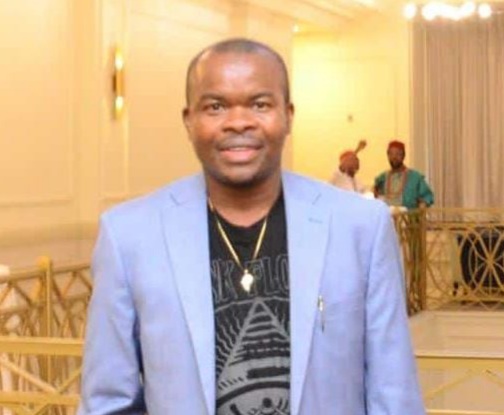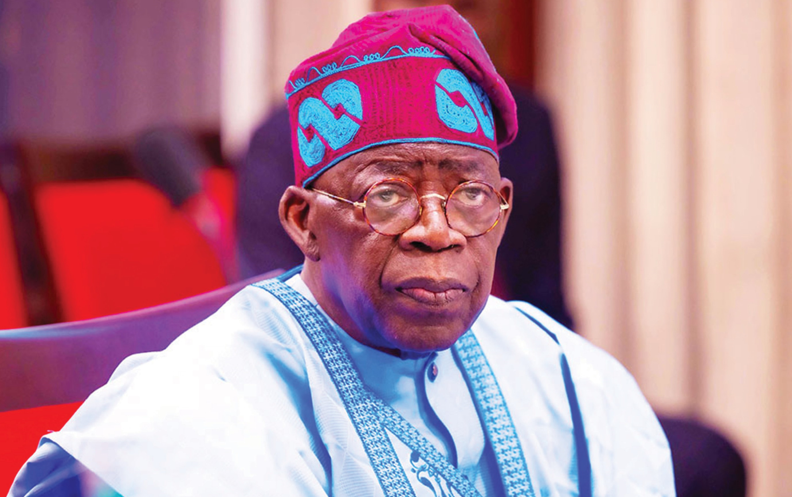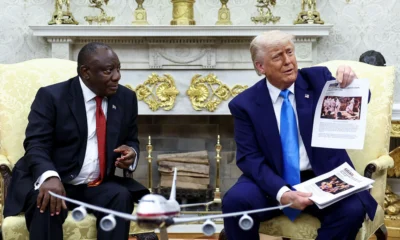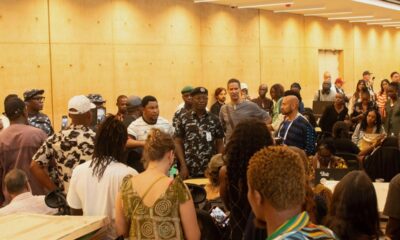Analysis
ECOWAS at 50: A Golden Jubilee or a Crisis of Credibility?, by Boniface Ihiasota

ECOWAS at 50: A Golden Jubilee or a Crisis of Credibility?, by Boniface Ihiasota
As ECOWAS marks its 50th anniversary, the moment calls for more than celebration. It demands a sober reflection on whether the regional bloc founded in 1975 has truly lived up to its promise of integration, stability, and shared prosperity. Five decades after the Treaty of Lagos brought together 15 West African states in a bold attempt to reshape the region’s fortunes, the aspirations of unity and development now confront a landscape marked by deepening insecurity, uneven economic progress, and political fragmentation.
The founders of ECOWAS envisioned a region where borders would cease to be barriers to opportunity. Visa-free travel for up to 90 days, adopted early in the bloc’s history, was a major leap toward that goal. Over the years, ECOWAS also established the Trade Liberalization Scheme to reduce tariffs and encourage intra-regional trade, created the ECOWAS Court of Justice and Parliament to strengthen governance, and set up the West African Health Organization to coordinate public health responses. These institutions reflect the early confidence that West Africa could chart a collective path towards economic integration and political stability.
However, the data behind the region’s economic performance reveals a more complicated picture. Intra-regional trade remains low, hovering between 8 and 13 percent according to recent analyses, which places ECOWAS far behind other regional blocs where intra-community trade accounts for over 40 percent of economic activity. This persistent underperformance stems from structural factors such as poor transport infrastructure, cumbersome border procedures, and inconsistent regulatory frameworks. Even more striking is the extent to which official trade figures underrepresent reality. A joint ECOWAS–Afreximbank–UNECA study shows that a substantial portion of cross-border trade remains informal and unrecorded, especially in agricultural commodities. An OECD study further notes that when unrecorded food trade is included, more than half of West Africa’s food exports stay within the region, a sign that the potential for integration exists but is not captured in formal statistics.
Institutional weaknesses continue to undermine the region’s prospects. A recent study published by Springer found that differences in institutional quality, including governance effectiveness, transparency, regulatory consistency, and rule of law, account for more than 30 percent of the variation in intra-regional trade flows among ECOWAS states. Such gaps make harmonisation difficult and weaken the foundation for deeper economic integration. The much-anticipated single currency, the “Eco,” has suffered repeated delays due to divergent macroeconomic conditions, inconsistent fiscal policies, and political hesitations. What was once envisioned as a catalyst for regional trade has become a symbol of stalled ambition.
The challenges extend beyond the economic front. Security has become the most destabilising factor in the region. The Sahel, which stretches across several ECOWAS states, has become the world’s deadliest zone for terrorism. The 2025 Global Terrorism Index reports that the Sahel accounted for 51 percent of global terrorism-related deaths in 2024, with an estimated 3,885 fatalities out of 7,555 recorded worldwide. Nigeria alone accounted for 565 terrorism-related deaths in the same year, placing it sixth globally in terms of terrorism impact. Groups such as Boko Haram, Islamic State West Africa Province, and IS-Sahel operate across borders, exploiting weak governance, economic desperation, and political instability.
The withdrawal of Mali, Burkina Faso, and Niger from ECOWAS has further deepened regional vulnerabilities. These countries, once central to ECOWAS’s security cooperation framework, now move toward new alliances outside the bloc, reducing coordination on counterterrorism and leaving borders even more porous. Their military juntas accused ECOWAS of “inhumane sanctions” following coups, but their withdrawal has weakened collective security mechanisms at precisely the moment when regional cooperation is most needed. Without a coordinated front, peacekeeping operations become overstretched and less effective. ECOWAS has discussed plans for a new regional standby force, but estimates suggest it could cost up to $2.6 billion annually, a figure that far exceeds the current budgetary capacities of most member states.
Meanwhile, ordinary West Africans increasingly view ECOWAS as distant from their everyday realities. Despite the free movement protocol, harassment at borders persists. Economic challenges such as unemployment, inflation, and weak social services erode confidence in regional institutions. Many citizens question whether ECOWAS serves the people or political elites.
From the diaspora vantage point, the contrast is glaring. Those living in Europe, North America, or parts of Asia observe how strong institutions, rule of law, coordinated monetary systems, and responsive governance create functional regional communities. In such places, borders are not tools of intimidation, and integration is built on shared values rather than declarations.
As ECOWAS enters its second half-century, it must re-imagine its purpose with people at the center. The bloc needs stronger institutions capable of enforcing decisions and harmonising policies. It must modernise its trade systems, formalise cross-border commerce, and invest in digital infrastructure that connects markets. It must repair its fractured security architecture with both military and socio-economic strategies that address extremism’s root causes. And it must recognise the diaspora as a strategic partner — not just a source of remittances, but a reservoir of knowledge, capital, and global exposure.
The founders of ECOWAS dreamed of a region united in prosperity and peace. Fifty years later, that dream is still alive, but dimmed by the realities of fragmentation, insecurity, and institutional fragility. The golden jubilee is therefore not merely a celebration, but a call to action. If ECOWAS is to remain relevant over the next fifty years, it must transform itself from a bloc defined by declarations into a community defined by delivery.
Analysis
Gumi, National Security and the Implications of Media Attention

Gumi, National Security and the Implications of Media Attention
By Alabidun Shuaib AbdulRahman
In Nigeria’s protracted struggle with banditry, kidnapping, and insurgency, Sheikh Ahmad Abubakar Gumi has occupied a polarising space: simultaneously a respected Islamic scholar, a self-appointed mediator, and a frequent commentator in the national media. But as Gumi’s profile has grown, so too have concerns about the unintended or possibly deliberate consequences of elevating his voice.
His persistent presence comes at a cost: legitimising non-state armed actors, undermining state institutions, and, alarmingly, projecting a version of peace-making that risks normalising criminal violence. The events of May 2025, when Saudi authorities denied him entry into Medina for Hajj despite a valid visa, offer a sharp reminder that his influence is contested even beyond Nigeria, and public discourse must scrutinise it more carefully.
Gumi’s entrée into the national conversation rests on his dual credibility: he is both a former army captain and an Islamic scholar, a combination that lends him moral authority and access. He repeatedly depicts himself as a bridge between the Nigerian state and armed bandits, arguing that military force alone is no longer sufficient.
On 6 October 2024, in an interview reported by the International Centre for Investigative Reporting (ICIR), he declared: “Today, 90 per cent of our intelligence is garbage. What we have left is just about 10 per cent.” By publicly decrying the quality of intelligence, he undermines public confidence in Nigeria’s security architecture not merely offering critique, but positioning himself as someone whose moral insight fills a gaping institutional void.
He went further in that same interview, defending his deep access to bandit hideouts by insisting he always travels with state officials: “I have never been to any den of these people without officials … I go with the police because one cannot go alone.” This claim is double-edged. On the surface, it suggests cooperation with state institutions, but it also raises serious questions about the role of an unofficial, non-state intermediary in matters that typically fall within the purview of intelligence services and the military.
Gumi’s central argument revolves around negotiation. He frequently calls for dialogues and amnesty, suggesting that social and economic neglect, not ideology alone, drives banditry. But his approach tends to frame violent criminals as aggrieved moral actors rather than lawbreakers. By giving them a quasi‑political status as if they merit a seat at the negotiation table, he risks romanticising kidnapping and terror as merely “a reaction to deprivation.”
In his public interventions, he warns that an overemphasis on force may backfire, driving some bandits toward radicalisation. Yet this very narrative can be weaponised. When militants see themselves as wronged and mediated by a respected cleric, the notion of “negotiation” becomes a path to legitimacy rather than surrender.
These concerns are not theoretical. The security picture in Nigeria remains dire. According to the 2025 Global Terrorism Index, Nigeria recorded 565 terrorism-related deaths in 2024, up from 533 in 2023, placing the country sixth globally with a score of 7.658. The report highlights that the Islamic State in the Sahel (IS‑Sahel) carried out 16 attacks in Nigeria in 2024. These are not distant or abstract threats — they are real, rapidly evolving, and increasingly sophisticated. Amid this, Gumi’s message of negotiation may sound conciliatory, but it risks diluting the urgency of counterterrorism and deflecting pressure from strengthening state institutions.
Worse, by framing himself as the only viable interlocutor, Gumi may inadvertently weaken public trust in the military and intelligence services. If the populace is encouraged to believe that official agencies are fundamentally flawed, that “90 percent” of their intelligence is worthless, then his interventions risk replacing state authority with a parallel, informal alternative. That is perilous in a democracy where violence must be constrained by transparent, accountable institutions, not individual charisma.
Compounding these concerns, Gumi’s deportation from Saudi Arabia in May 2025 highlights that even foreign powers question his role. According to the Vanguard Newspapers, he was denied entry into Medina despite holding a visa. The Guardian reported that he publicly stated on his Facebook page that “for some obvious reasons — my views about world politics, the Saudi authorities are uncomfortable about my presence … even though they have granted me a visa.”
In a statement covered by PRNigeria, he echoed that sentiment: “the Saudi authorities are uncomfortable about my presence … because of my views on world politics.” According to Premium Times, he was part of a Nigerian delegation sponsored by the National Hajj Commission, yet was turned back by Saudi immigration officials upon arrival.
This development carries symbolic weight. A major Islamic country refused him entry not because of procedural oversight, but apparently because of ideological unease. The fact that Saudi Arabia, which presides over Islam’s holiest rites, barred him suggests that his influence is not merely spiritual; it is perceived as political and potentially disruptive. From a media-perspective, that should raise alarms. If a country like Saudi Arabia, deeply attuned to global Islamic discourse, regards him as a liability, why should Nigerian media continue to treat him purely as a peacemaker?
Moreover, his deportation recontextualises his domestic credibility. He claims moral authority born of negotiating in the forest, yet his rejection by Saudi immigration projects that his theological legitimacy is contested abroad. If his presence is deemed “uncomfortable” by conservative religious gatekeepers, then domestic coverage must interrogate what exactly he stands for, rather than granting him uncritical amplification.
Part of the problem lies in how the media portrays him. Often framed as the lone compassionate voice urging dialogue, his complex reality, as someone with ideological reach, political commentary, and informal security brokerage, is underreported.
Journalists must resist treating him as simply a “bridge man” and instead ask harder questions: What outcomes have his interventions produced? How many hostages has he secured release for? How many disarmed bandits has he helped return to society? These are not just moral questions but matters of public policy and security accountability. Without that scrutiny, his narrative risks overshadowing the very institutions that are constitutionally mandated to provide security.
Beyond accountability, the media must also centre the voices of victims. In Gumi’s discourse, bandits are portrayed as victims of neglect; yet the thousands of Nigerians who have suffered kidnapping, terrorism, and displacement rarely feature in his mediated narrative. The media must ensure that reconciliation does not eclipse justice: victims’ trauma, their demand for justice, and their right to a secure society must remain core to any public conversation. Otherwise, coverage risks valorising a peace built on negotiation without consequence, rather than on accountability, deterrence, and institutional strengthening.
It is true that dialogue and community engagement are important tools in conflict resolution. But Gumi’s approach should not become synonymous with peace. By allowing him to dominate public debate unchecked, the media risks endorsing a peace that lacks democratic legitimacy. He is not a government‑appointed envoy; he acts on his own authority. That distinction matters urgently. The credibility he commands must be matched by responsibility, transparency, and a willingness to submit to public accountability.
Gumi’s exclusion from the 2025 Hajj is a pointer that, despite his domestic influence, his ideas are contested at the highest levels of the Muslim world. It suggests that his ideological reach, far from benign, may be unsettling to states deeply invested in religious orthodoxy and geopolitical stability. For Nigerian media outlets both local and national, this signals a need for recalibration. His voice should be part of the discourse, but not its centrepiece; his interventions merit coverage, but not uncritical deification.
In sum, Sheikh Ahmad Gumi’s repeated media spotlight poses a strategic and moral dilemma. His critique of Nigeria’s intelligence architecture, delivered in moral tones, may resonate with citizens frustrated by insecurity but it also undermines institutional confidence and creates a parallel narrative of justice.
The media must rethink how it covers Gumi: not to silence him, but to demand rigorous accountability, data‑driven analysis, and a balanced framing that does not sideline victims or state legitimacy.
Analysis
Trump’s Blacklist and the Burden of Nigeria’s Image, by Boniface Ihiasota

Trump’s Blacklist and the Burden of Nigeria’s Image, by Boniface Ihiasota
The recent controversy over alleged “Christian genocide” in Nigeria has once again dragged the country’s name into a diplomatic storm. U.S. President Donald Trump’s push for Nigeria’s redesignation as a “country of particular concern” for religious freedom, coupled with his fiery rhetoric about “Christian persecution,” has amplified an already delicate global perception of Nigeria. In the U.S., Christian advocacy groups cite years of killings in the Middle Belt and northern states as evidence of systematic extermination; in Nigeria, officials insist the claim is exaggerated, arguing that the violence is driven more by terrorism, banditry, and communal disputes than by religion. Between these extremes lies a complex, painful reality that demands honesty and nuance.
There is no denying that Christians have suffered devastating attacks, alongside Muslims and others, across Nigeria’s conflict zones. Human Rights Watch, the International Crisis Group, and the Armed Conflict Location & Event Data Project (ACLED) have all documented repeated massacres of civilians. Between January 2024 and mid-2025, ACLED recorded over 6,200 civilian deaths across Nigeria’s northern states with Benue, Plateau, Kaduna, Zamfara, and Borno among the hardest hit. The U.S. Commission on International Religious Freedom (USCIRF) has, for years, accused the Nigerian government of failing to adequately protect religious minorities or prosecute perpetrators of sectarian violence.
However, most conflict researchers and rights organisations stop short of describing the situation as “genocide.” The legal definition of genocide — requiring intent to destroy, in whole or part, a specific group is rarely met in Nigeria’s case. Boko Haram and Islamic State West Africa Province (ISWAP) clearly target Christians and moderate Muslims, but their goal is ideological domination, not total extermination. In the Middle Belt, violence is often rooted in competition for land and water between mostly Muslim pastoralists and mostly Christian farmers, worsened by climate change and weak governance. In the Northwest, killings and kidnappings are driven by criminal banditry and ransom economies.
The genocide narrative, though emotionally powerful, risks flattening these distinctions. It can harden identity lines, fuel retaliatory cycles, and distract from addressing root causes such as poor policing, corruption, and the failure of justice institutions. Still, calling the violence merely “communal clashes” trivialises the scale of human loss. In 2024 alone, Open Doors USA estimated that nearly 5,000 Christians were killed for their faith in Nigeria more than in any other country while Intersociety, a Nigerian watchdog, put the number closer to 7,000. These are not mere statistics; they represent shattered families, displaced communities, and the slow erosion of coexistence.
The Trump-led pressure on Nigeria is therefore a double-edged sword. On one hand, it forces international attention on a crisis often met with domestic indifference. The U.S. redesignation could push Nigeria toward greater accountability if it comes with constructive engagement and verifiable benchmarks for justice and protection. On the other, it risks reducing Nigeria to a caricature of religious war, empowering extremist voices, and alienating allies. Diplomacy by blacklist rarely solves complex conflicts; it often deepens mistrust.
Nigeria’s official response so far has been defensive. The government points to military campaigns against insurgents, thousands of arrests, and new community policing initiatives. Yet the absence of transparent investigations and successful prosecutions undermines these claims. The National Human Rights Commission has repeatedly lamented the culture of impunity that allows mass killings to go unpunished. Moreover, humanitarian conditions remain dire. According to the International Organization for Migration, over 3.2 million people remain internally displaced across northern Nigeria as many living in conditions ripe for radicalisation or exploitation.
If Nigeria is to reclaim its image, the government must move beyond rhetoric. First, independent investigations into mass killings from Benue to Zamfara should be conducted and their findings made public. Second, justice must be visible. The prosecution of both insurgent leaders and complicit security agents is essential to rebuild trust. Third, early-warning and mediation mechanisms should be strengthened in flashpoint areas, with community-based peacebuilding initiatives supported by both federal and local authorities.
For the international community, punitive measures alone are not enough. Sanctions, visa bans, and blacklists make headlines but seldom yield reform. What Nigeria needs is sustained technical and humanitarian support, funding for evidence-based investigations, victim rehabilitation, and local governance reforms that address the economic roots of violence. The U.S., the European Union, and the African Union should coordinate to ensure that any pressure on Nigeria is balanced with assistance that strengthens, rather than isolates, state institutions.
Nigerians in the diaspora also have a role to play. We must defend our nation’s integrity while refusing to whitewash its failures. The diaspora can lobby for balanced international engagement by urging foreign partners to back truth commissions, judicial reforms, and development projects in affected regions, rather than merely echoing partisan narratives.
Ultimately, Nigeria’s burden is one of perception and performance. The world will believe what it sees and what it sees, for now, are images of grief, displacement, and unanswered questions. To cleanse its image, Nigeria must first confront its own reflection: the failure to protect its people, to tell its own story truthfully, and to act decisively against those who profit from chaos.
If Trump’s blacklist serves any purpose, it should be to jolt Nigeria into self-accountability, not self-pity. Only by facing facts — the killings, the displacement and the impunity can Nigeria rise above the noise of international accusation. A nation that values its pluralism must prove it in action. Anything less is an abdication of responsibility to both history and humanity.
Analysis
The Price of Nigeria’s Diplomatic Vacuum, by Alabidun Shuaib AbdulRahman

The Price of Nigeria’s Diplomatic Vacuum, by Alabidun Shuaib AbdulRahman
There is a language nations speak without words: the handful of flags that fly over their embassies, the names on the placards at international conferences, the faces who present credentials to foreign heads of state. A steady, visible, and authorised presence is itself a powerful form of diplomacy. Conversely, absence speaks too: it is read as drift, as indifference, as lack of capacity. For over two years now, Nigeria has been sending a troubling message to the world by omission and the recent storm around U.S. reactions to violence in Nigeria has only made that silence more dangerous.
In September 2023, President Bola Ahmed Tinubu ordered an unprecedented recall of Nigerian envoys, a sweeping reset that swept through 109 missions worldwide. The recall was widely reported and framed as part of a “comprehensive restructuring” of the foreign service. Yet what followed was not a quick redeployment but a prolonged vacuum. Many of Nigeria’s 109 missions, by the Ministry of Foreign Affairs’ own count, made up of 76 embassies, 22 high commissions, and 11 consulates, have operated for over 25 months and counting without substantive ambassadors.
This is not trivia. Ambassadors are not ceremonial appointments; they are policy instruments. They lobby, they explain, they convene, they protect citizens, and often they move quietly to avert crises that would otherwise become headlines.
The danger of that deficit became painfully visible in the past fortnight when the United States took a dramatic step: Nigeria was added to a religious-freedom watch list and President Donald Trump publicly warned of sanctions and even threatened military “action” if alleged abuses were not addressed. The statement as reported across major outlets did not arise in a vacuum. It surfaced at a moment when narratives about insecurity in Nigeria, amplified by transnational networks and sympathetic political forces in Washington, had already gained purchase.
In such moments, a credible and well-placed ambassador can make an enormous difference — briefing congressional staff, arranging private meetings with State Department principals, convening diaspora interlocutors and think-tank experts, and getting the facts, context and data into the hands of decision makers. With a substantive ambassador absent, those lines of direct, high-level persuasion are far weaker.
Look back and you will see how effective envoys have been in previous crises. Nigeria’s ambassadors have repeatedly been the country’s first line of defence in moments of reputational peril. Joy Uche Angela Ogwu, who served as Nigeria’s Permanent Representative to the United Nations, chaired the UN Security Council and used that platform to shape debates about peacekeeping and African security, raising Nigeria’s profile at critical junctures. Christopher Kolade’s tenure in London helped restore confidence in Nigerian-UK relations in the early 2000s; his personal credibility smoothed rough political moments and opened space for trade and cooperation. And career diplomats such as Ade Adefuye in Washington combined scholarship with statecraft to keep complex bilateral channels open when tensions threatened to escalate. These are not anecdotal footnotes: they are evidence that skilled ambassadors change outcomes.
The facts of Nigeria’s current political economy make this vacuum all the more costly. Formal diaspora remittances rose sharply in 2024: the Central Bank of Nigeria reported that personal remittance receipts increased to about $20.9 billion in 2024 — a lifeline for families, a buffer for foreign-exchange reserves, and a major instrument of economic resilience. That stream of capital arrives and is mediated through embassies and consulates that service diasporas in the United States, Europe and the Gulf. Where missions are leaderless or under-resourced, vital consular functions suffer and diaspora engagement weakens.
At home, the macroeconomic and social context is thorny. Headline inflation after peaking in 2024 was reported to have eased to around 18.02% in September 2025, a signal of nascent stabilization but still a heavy burden for citizens struggling with the rising cost of living. Unemployment figures remain contested because of methodological revisions at the statistical office, but credible reporting and international observers warn that youth under-employment and precarious work remain structural challenges that require external partnerships (investment, skills exchanges, technology transfers) to address meaningfully. Ambassadors are key to courting that investment and to telling the nuanced story of reform on the ground.
So what precisely does Nigeria stand to lose and what could a full diplomatic corps still salvage?
First, influence in high-stakes bilateral relationships. The United States, the United Kingdom, China, the Gulf states and the European Union are not just partners; they are sources of investment, security cooperation and multilateral leverage. An ambassador with a direct line to Washington or Brussels can move quickly to protect bilateral programmes, reassure partners, and correct misrepresentations as past envoys have done during periods of acute scrutiny. The absence of properly accredited envoys reduces Nigeria to reactive press statements delivered from the Presidency rather than proactive personal diplomacy in the capitals that matter.
Second, the operational loss: trade facilitation, investor matchmaking and visa reciprocity. Nigeria’s spot at the table in negotiations over AfCFTA rules, digital trade norms, and technical cooperation is best defended by envoys who know both the domestic policy detail and the host country’s political rhythms. Several recent reports have highlighted how coordination problems between ministries and missions slowed post-summit follow-ups after presidential trips as opportunities erode faster than rhetoric.
Third, diaspora protection and remittances. Embassies are the interface for millions of Nigerians abroad. When missions are understaffed or run by officers with limited mandate, the timeliness and effectiveness of consular assistance from passport services to crisis interventions deteriorate. This is more than inconvenience. It damages confidence, reduces formal remittance channels and diminishes the state’s capacity to mobilise its diaspora as economic and political assets.
Fourth, reputational repair. Foreign-policy shocks stick. Narratives once set whether about corruption, insecurity, or human-rights violations become grist for activists, competitors, and foreign legislatures. Ambassadors are the corrective lens that present balanced data, context and counter-narratives. Without them, the field is left to town criers abroad and hostile networks who have incentives to amplify worst-case versions of our reality. The Trump episode is an instructive example: the designation and the rhetoric around it show how quickly international policy can be reframed by a small but influential political ecosystem.
This is not to excuse poor choices or to ask for haste without quality. Ambassadorial appointments must be meritocratic, transparent and strategic. Nigeria’s foreign service needs both seasoned career diplomats and well-qualified non-career appointees who understand the country’s reform agenda. Ambassadors must be given clear, measurable mandates: increase two-way investment by X percent within Y years; secure technical partnerships in health and security; deepen research and educational linkages; protect diaspora welfare; and actively manage national narratives in host countries. Those targets make appointments accountable and useful.
There are signs the presidency recognises the urgency. Reports in national outlets indicate that the administration has moved to finalise ambassadorial lists and that nominations are expected to be announced. If true, the moment is to get it right, but without turning diplomacy into patronage. A carefully selected diplomatic bench, empowered with clear objectives and proper resourcing, can begin the work of repairing lost ground and seizing opportunities.
Finally, a larger principle underwrites the immediate ask: diplomacy is national infrastructure. Like rail or broadband, it must be maintained lest the nation’s productive capacity shrink. For a country as large and consequential as Nigeria, diplomats are not expendable extras; they are assets of sovereignty. The choice to leave missions headless for too long is a strategic gamble that exacts real costs in economic, security and reputational.
The practical remedy is straightforward: nominate steadily, vet transparently, deploy decisively, and hold envoys to clear deliverables. But the moral case is as important: if a nation expects the world to take its reforms, its developmental aspirations, and its security concerns seriously, it must be present where the world decides. Silence in the corridors of influence will be read as absence of will. Nigeria cannot afford either.
A restored and purposeful diplomatic corps will not fix every problem. But it will restore Nigeria’s voice, the first indispensable step toward shaping the narratives that determine whether we are judged by our worst headlines or by our capacity to reform, to protect citizens, and to compete for the future. If the Tinubu administration is serious about the Renewed Hope Agenda, then it must treat ambassadorial appointments as policy imperatives, not political rewards.
Alabidun is a media practitioner and can be reached via alabidungoldenson@gmail.com
-

 Politics5 days ago
Politics5 days agoTrump Snubs G20 Summit over ‘White Genocide’ Claims in South Africa
-

 Analysis5 days ago
Analysis5 days agoTrump’s Blacklist and the Burden of Nigeria’s Image, by Boniface Ihiasota
-

 News5 days ago
News5 days agoProtesters Disrupt Preview of Multi-Million Dollar Museum in Benin City
-

 News5 days ago
News5 days agoCARICOM to Host Webinar on E-Waste Management in Renewable Energy Systems
-

 Extra5 days ago
Extra5 days agoAyomide Kashim Ibrahim: Redefining Global Finance Through Inclusion and Innovation
-

 News5 days ago
News5 days agoTrump Blasts ‘Corrupt Journalists’ After BBC Chief Resigns Over Documentary Scandal











